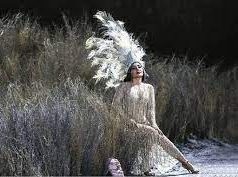An opera directed by Barry Kosky has become a much anticipated feature of the Adelaide Festival of Arts. In this year’s production he again provides brilliant staging, imaginative chorus work, especially the horse heads on dancers’ legs, the deceptively simple yet very effective set with the gallows tree and the costuming.
The Golden Cockerel, is an opera in three acts, based on a poem by Alexander Pushkin, and composed at a time of turmoil in Russia. It has to be seen as satirical attack on a regime when Nicholas Tsar II, supreme ruler, was faced with a country in turmoil, and humiliated by the defeat in the 1907 war with Japan. It is no wonder that the opera was banned by the Russian censors, and possibly Putin, in our own time, would be tempted to follow suit.
The opera begins with a Prologue, in which the Astrologer tells the audience that while what they are about to see is fairy tale, it has a true moral.
Act One: Enter Tsar Dodon, sung and portrayed magnificently by Paulo Hunka, as a doddery old man, dressed very shabbily, no longer interested in defending his country against its enemies, instead wishing to spend his last years sleeping, eating and being entertained. His two sons, (Nicholas Jones and Samuel Dundas) who wrestle like silly school boys, are both anxious to inherit the kingdom, and far less keen to go to war. Yet to war they are sent.
All the Tsar’s trouble seem to be over when the Astrologer, (Andrei Popov), gives him the Golden Cockerel, which will warn him when there is danger. This exotic bird resides high in a tree,(on stage Matthew Whittet) and is sung off stage by Samantha Clark.The Tsar’s needs are served by the Amelfa, the housekeeper, (Alexandra Durseneva,) Military advice, always rejected, is offered by General Polkon, (Mischa Shulman).
The second act is dominated by the Queen of Chemakla who arrives, without her army, claiming that her beauty is enough to win the war. This is a huge role, and needs a singer who can navigate the technical difficulties, while having the face and figure of a seductress. Venera Grimadieva, succeeds on both fronts, shimmering and shimmying, enticing and cajoling, until Dodon is a quivering mass of desire and subjection. All this while she sings.
The pomp and splendour for the wedding of Dodon and the Queen is a time for rejoicing by the people. All comes to an end when the Astrologer returns to ask the promised favour of the Tsar, a favour which he will not grant. In fury the Tsar kills the Astrologer, and the Cockerel, loyal to his master, kills the Tsar. The Queen and the bird depart.
In the Epilogue the Astrologer returns to tell the audience that none of this story is true, and that only he and the Queen were real.
The orchestra, conducted by Armo Volmer and the State Opera Chorus, trained by Anthony Hunt, were excellent. The music, reminiscent of the Arabian Nights with Russian overtones, from the beginning to the final chord is totally satisfying. It is an opera that does not touch the heart so much as appeal to the mind, finding the message beneath the magic, the absurdity, the humour and the satire.
The Golden Cockerel Festival Theatre 4-9 March
By Nickolai Rimsky-Korsakov
Conducted by Arvo Volmer
Directed by Barrie Kosky
Emily Sutherland

